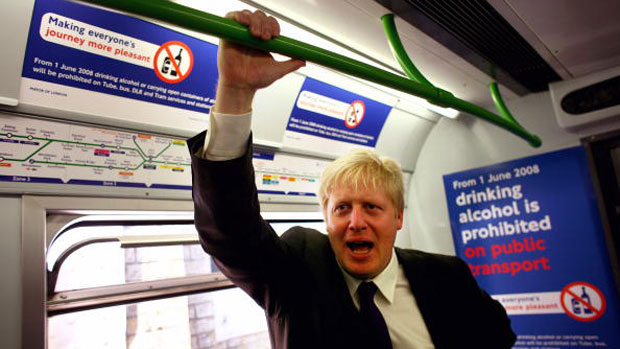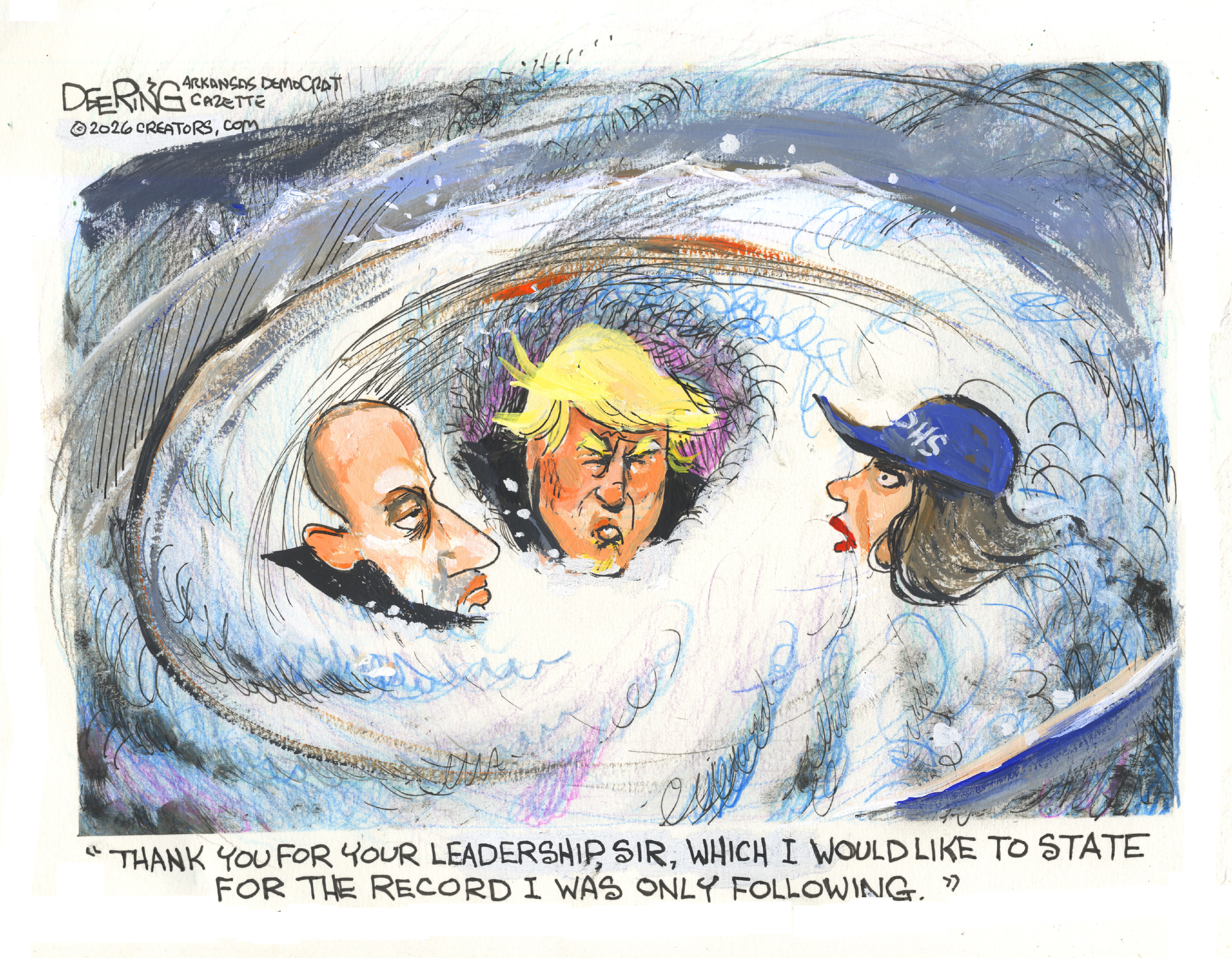Tube strike: real reason why Boris wants tough new laws
Mayor is thinking ahead of today's Underground strike to the impending battle over driverless trains

A free daily email with the biggest news stories of the day – and the best features from TheWeek.com
You are now subscribed
Your newsletter sign-up was successful
TODAY’S strike on the London Underground, which has disrupted hundreds of thousands of journeys into work, will almost certainly lead to a Tory election manifesto pledge to toughen trade union laws, it emerged this morning.
But will the new measures go as far as Boris Johnson, the Conservative Mayor of London, would like? Probably not.
Boris went on Radio 4’s Today programme this morning to renew his call for the rules on secret ballots to be toughened. He wants it made illegal for a union to call a strike without gaining the support of more than half the balloted workforce.
The Week
Escape your echo chamber. Get the facts behind the news, plus analysis from multiple perspectives.

Sign up for The Week's Free Newsletters
From our morning news briefing to a weekly Good News Newsletter, get the best of The Week delivered directly to your inbox.
From our morning news briefing to a weekly Good News Newsletter, get the best of The Week delivered directly to your inbox.
At the moment, the threshold is 50 per cent of those who actually return their the ballot papers: this means that in a low “turnout”, it is possible for a strike to be called based on the wishes of only a minority of the union workforce, while the silent majority is ignored.
In the case of the current Tube strike, for instance, out of 3,356 votes cast by RMT members, 2,567 were in favour of strike action. BUT only 40 per cent had returned their ballot papers.
Nick Robinson, the BBC’s political editor, said Downing Street is already working on a manifesto pledge to tighten the laws for legal strikes, but favours alternatives to Boris’s proposal, such as the introduction of French-style minimum service agreements with unions, voluntarily limiting the scope for strike action by negotiation.
“They are also examining tightening the rules governing ballots to give unions less flexibility on the timing of strike action after the ballot itself,” Robinson said.
A free daily email with the biggest news stories of the day – and the best features from TheWeek.com
Boris is undaunted by Downing Street's rejection of his plan so far. He knows many grassroots Conservative supporters would back a Boris Law to control the unions.
The idea of raising the threshold for a legal strike to 50 per cent of the balloted union workforce is unfinished business stretching back to the years of Margaret Thatcher.
Thatcher introduced the need for legal ballots with a lower threshold shortly before the miners' strike in 1984 with a ban on secondary picketing. She held back from requiring 50 per cent of the workforce to give their approval for strike action because she adopted a gradual approach to tightening trade union law.
But there’s nothing gradual about Boris Johnson’s wishes. He told Nick Robinson: "We will continue to be vulnerable to this kind of pointless strike action unless and until we get that legislation.”
Boris said he would also favour banning those in essential public services from strike action, as happens in some other capitals. “There are plenty of other capital cities around the world that have a total ban on strikes in essential public services,” said Boris. “The government has decided not to go for that. They are wrong.”
The 48-hour strike which began yesterday evening is over the mayor's plans to close ticket offices and move entirely to automated ticket machines. Staff would be reduced by voluntary redundancies, and some would be redeployed on platforms. The two unions involved, the RMT and the TSSA, have refused to accept job cuts.
On Twitter, David Cameron said the "shameful" strike would bring "misery to millions of Londoners".
But Bob Crow and Manuel Cortes, leaders of the RMT and the TSSA, have accused Johnson of refusing to meet them to discuss the ticket office closures. Crow resorted to ringing up Boris yesterday at LBC Radio where the mayor was hosting a phone-in show and trying to negotiate over the air. Johnson refused, and told Crow to get round the table with his negotiators.
Labour's leader Ed Miliband said it was "deeply regrettable" that no negotiation or meetings with the mayor and Transport for London seemed to have happened.
The public may feel they are the meat in the sandwich as they try to find alternative ways to get into work today, but Boris appears determined not to give way. The real fear of the RMT is that it is a dry run for the eventual removal of all drivers on the London Underground and a move to automated trains.
That is why the mayor knows that the law on legal strike action by the public services will need to be tightened if the Tories can win the 2015 general election.
-
 6 gorgeous homes in warm climes
6 gorgeous homes in warm climesFeature Featuring a Spanish Revival in Tucson and Richard Neutra-designed modernist home in Los Angeles
-
 Russia’s ‘cyborg’ spy pigeons
Russia’s ‘cyborg’ spy pigeonsUnder the Radar Moscow neurotech company with Kremlin-linked funding claims to implant neural chips in birds’ brains to control their flight, and create ‘bio-drones’
-
 Political cartoons for February 8
Political cartoons for February 8Cartoons Sunday’s political cartoons include going down the drain, American history, and more
-
 The high street: Britain’s next political battleground?
The high street: Britain’s next political battleground?In the Spotlight Mass closure of shops and influx of organised crime are fuelling voter anger, and offer an opening for Reform UK
-
 Is a Reform-Tory pact becoming more likely?
Is a Reform-Tory pact becoming more likely?Today’s Big Question Nigel Farage’s party is ahead in the polls but still falls well short of a Commons majority, while Conservatives are still losing MPs to Reform
-
 Asylum hotels: everything you need to know
Asylum hotels: everything you need to knowThe Explainer Using hotels to house asylum seekers has proved extremely unpopular. Why, and what can the government do about it?
-
 Taking the low road: why the SNP is still standing strong
Taking the low road: why the SNP is still standing strongTalking Point Party is on track for a fifth consecutive victory in May’s Holyrood election, despite controversies and plummeting support
-
 Behind the ‘Boriswave’: Farage plans to scrap indefinite leave to remain
Behind the ‘Boriswave’: Farage plans to scrap indefinite leave to remainThe Explainer The problem of the post-Brexit immigration surge – and Reform’s radical solution
-
 What difference will the 'historic' UK-Germany treaty make?
What difference will the 'historic' UK-Germany treaty make?Today's Big Question Europe's two biggest economies sign first treaty since WWII, underscoring 'triangle alliance' with France amid growing Russian threat and US distance
-
 Is the G7 still relevant?
Is the G7 still relevant?Talking Point Donald Trump's early departure cast a shadow over this week's meeting of the world's major democracies
-
 Angela Rayner: Labour's next leader?
Angela Rayner: Labour's next leader?Today's Big Question A leaked memo has sparked speculation that the deputy PM is positioning herself as the left-of-centre alternative to Keir Starmer